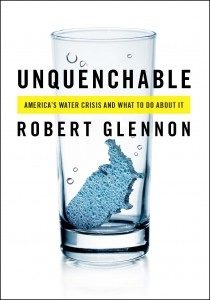by Amy Meyer
 Our society has been bred to view water as an intrinsic right, but how much water do we really need? How can we manage our resources wisely, and prioritize our conservation of water vs energy? In his book, Unquenchable: America’s Water Crisis and What to Do About It, Robert Glennon discusses political and technological solutions to our water woes. This month, guest blog author and WEN book club member Amy Meyer discusses Glennon’s book and its implications for environmental professionals in the Bay Area.
Our society has been bred to view water as an intrinsic right, but how much water do we really need? How can we manage our resources wisely, and prioritize our conservation of water vs energy? In his book, Unquenchable: America’s Water Crisis and What to Do About It, Robert Glennon discusses political and technological solutions to our water woes. This month, guest blog author and WEN book club member Amy Meyer discusses Glennon’s book and its implications for environmental professionals in the Bay Area.
WEN’s Green Reads book groups are collaboratively organized and run by women, and for women, in the WEN community. WEN members currently host a “Green Reads” book club in the East Bay and in San Francisco.
Several WEN members have shown interest in a South Bay group. If you are interested in joining the list for a potential South Bay group, or would be interested in helping get this group started, please email WEN.
On July 7th, the recently formed San Francisco chapter of Green Reads met to discuss Robert Glennon’s Unquenchable: America’s Water Crisis and What to Do About It. The book is technical but very approachable, and Glennon’s dry sense of humor nicely complemented the core tenant of the book – the US is rapidly running out of water.
The book outlines our current water crisis, providing numerous examples of wasteful practices and lack of effective water policy. It is not only the drier, western states that receive Glennon’s scrutiny, but also those cities and states falsely perceived to be water-rich. At its core, the book highlights the incompatibility of the strain placed on our water system by rising population, coupled with wasteful practices and contamination of our groundwater supply.
Our society has been bred to view water as an intrinsic right, something that, as humans, we are simply entitled to have. Glennon agrees with the premise that all people deserve access to clean water, but notes the stark difference between water needed for subsistence and hygiene, and the massive amounts that most of us use indiscriminately each day. He suggests a nuance on the idea of a right to water, asserting that while we are all entitled to a base allotment, it is not our ‘right’ to use water recklessly or wastefully. Of course, this requires significant shifts in our societal perception of water, as well as substantial policy and infrastructural changes.
One of his key points, and of particular interest to those of us at WEN, is the critical intersection between water and energy. Both are at the core of our modern society, and unfortunately require vast amounts of the other for production. Most forms of energy production require large volumes of water, and on the other side of the equation our water treatment systems require large amounts of energy. This connection further exacerbates our water (and energy) woes, and limits the efficacy of water-saving solutions that require large inputs of energy – think desalinization plants.
To ease our spirits following the in-depth discussion of America’s water crisis, Glennon rounds out his book by reviewing what he dubs as ‘real’ and ‘surreal’ solutions, finally leaving us with his own outline of effective new approaches. Some of his key suggestions include:
- Using price signals and creating market incentives
- Reexamining how we dispose of human waste
- Separating storm water from sewer water
- Creating infrastructure with dual pipes to supply potable and reclaimed water
- Removing barriers to water transfers while providing for government oversight of them
- Requiring developers to pay their own way
- Metering water use
As with countless issues in the environmental sector, the solution to our troubles appears to be a mix of technology and policy, and the delicate balancing act of not relying too heavily on one or the other. Ultimately, Glennon has produced an engaging book and left us Green Readers that much more aware of the water we consume.
 Amy Meyer is a Colorado-native focused on the intersection between sustainability, energy and economic development across the local and global communities. Most recently she worked at Navigant Consulting, specializing in behavioral energy efficiency programs and changing the way that human beings interact with their energy systems in their home and at work. Amy earned her Bachelor of Arts degree in Environmental Studies and Ecology and Evolutionary Biology from the University of Colorado and you are likely to find her hiking, cooking healthfully and creatively, trying out new activities, or working towards a sustainable future.
Amy Meyer is a Colorado-native focused on the intersection between sustainability, energy and economic development across the local and global communities. Most recently she worked at Navigant Consulting, specializing in behavioral energy efficiency programs and changing the way that human beings interact with their energy systems in their home and at work. Amy earned her Bachelor of Arts degree in Environmental Studies and Ecology and Evolutionary Biology from the University of Colorado and you are likely to find her hiking, cooking healthfully and creatively, trying out new activities, or working towards a sustainable future.
